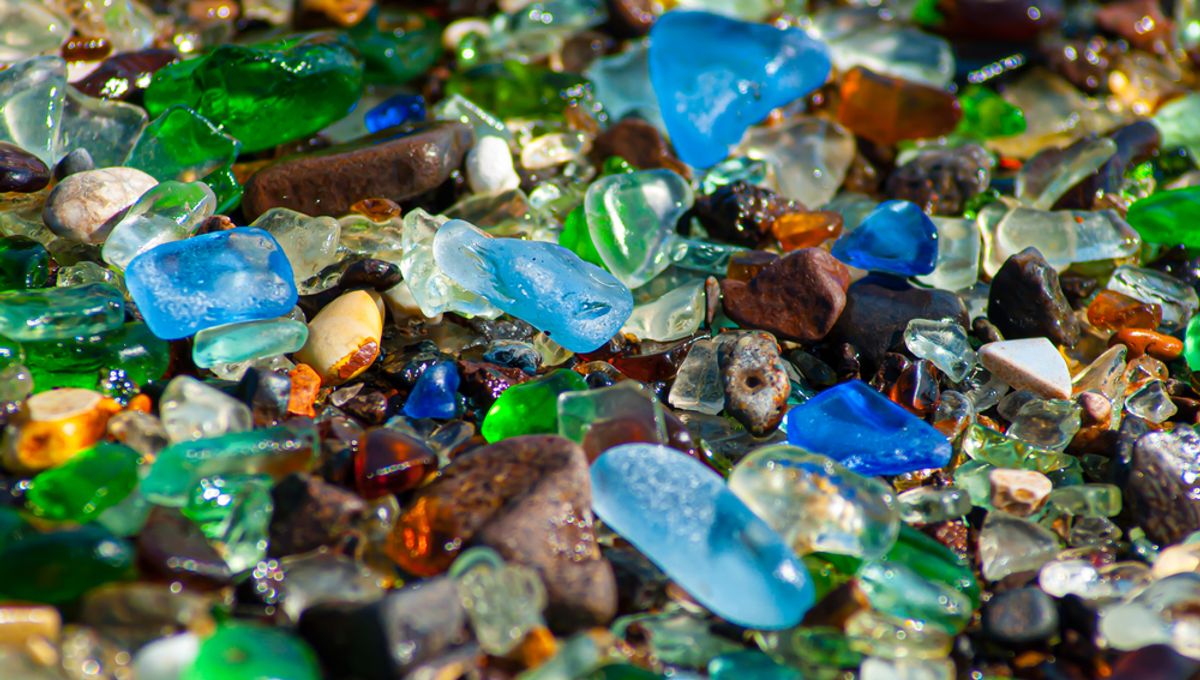
It may feel like we’re always telling you what not to do – don’t stack rocks while out hiking; leave that sand dollar alone – but, just this once, here’s something you can do: hold onto shards of sea glass if you stumble across them on the beach.
In fact, when it comes to sea glass, taking it away is actually encouraged as it helps to clean up beaches. The colored fragments may look pretty but they’re technically litter, which means you’re free to take as much as you can carry.
What is sea glass?
Sea glass begins life as discarded trash: it’s mostly made up of glass bottles, tableware, or other glass waste that finds its way into the ocean and then gets tossed around, broken, and tumbled smooth by the waves and currents.
This process takes decades, sometimes even hundreds of years, and results in small pieces of colorful glass, with smooth edges and a frosted appearance.
Where does sea glass come from?
When we throw glass away, it can end up in landfill if not recycled. Here, exposed to the elements, it can make its way into nearby waterways, alongside other trash.
On its journey to the sea, it bumps into rocks and other objects and breaks up into smaller pieces. Once there, wave action sees the glass rub up against the abrasive, sandy seafloor, which causes its edges to become smooth and gives it its distinctive, pitted look.
However, since the proliferation of single-use plastics began in the 1970s, glass has become a less popular choice. And now, with us all being encouraged to recycle the glass we do use, there is less scope for it to end up in our oceans, and therefore of it becoming sea glass, as Lori Weeden, a Teaching Professor of Environmental Earth and Atmospheric Sciences, explains in a piece for The Conversation.
“With the explosion of single-use plastics as an alternative to glass bottles, sea glass may soon become harder to find, with less glass and more plastic in the supply chain,” Weedon writes. “As sea glass becomes harder to find, some retailers are creating their own artificial sea glass using rock tumblers and chemicals.”
How to tell the difference between real and artificial sea glass
To mimic the processes that happen in the ocean to create genuine sea glass, broken glass can be tumbled in a machine, sand blasted, or immersed in acid-etching chemicals. The result looks a lot like the real thing – but there are some telltale differences.
According to the International Sea Glass Association, genuine sea glass often retains lettering, images, and distinguishing features (like handles or bottle necks) that tend to be absent when made artificially. The real deal also feature a more frosted surface, with “C” shaped patterns and imperfections such as cracks and crevices. You may also find a few grains of sand still clinging to it.
Artificial sea glass, on the other hand, is usually more uniform in shape and texture, and may come in more unusual colors and chunkier shapes.
Is it illegal to take sea glass off beaches?
No, it is not illegal to collect sea glass should you find it. It goes against the “leave only footprints and take only photos” mantra that conservationists normally preach, but as we’ve established, sea glass is trash and so you’d be doing the beach a favor by taking it with you.
“It is litter,” Steve Trewhella, author of The Essential Guide to Beachcombing, told The Guardian in 2018. “Unless the landowner has stipulated that nothing is to be removed from the beach.” But if not, that sea glass treasure is all yours.
If you don’t take it, chances are someone else will, and they might be making a pretty penny from it too. Selling and trading sea glass is a multimillion-dollar industry in the US, with the shards used in jewelry and to make other decorative items.
Whether you choose to sell it, keep it, or turn it into something fancy, know that by taking it with you, you’re doing a little bit to keep our beaches clean.
Source Link: What Is Sea Glass And Can You Keep It If You Find It?